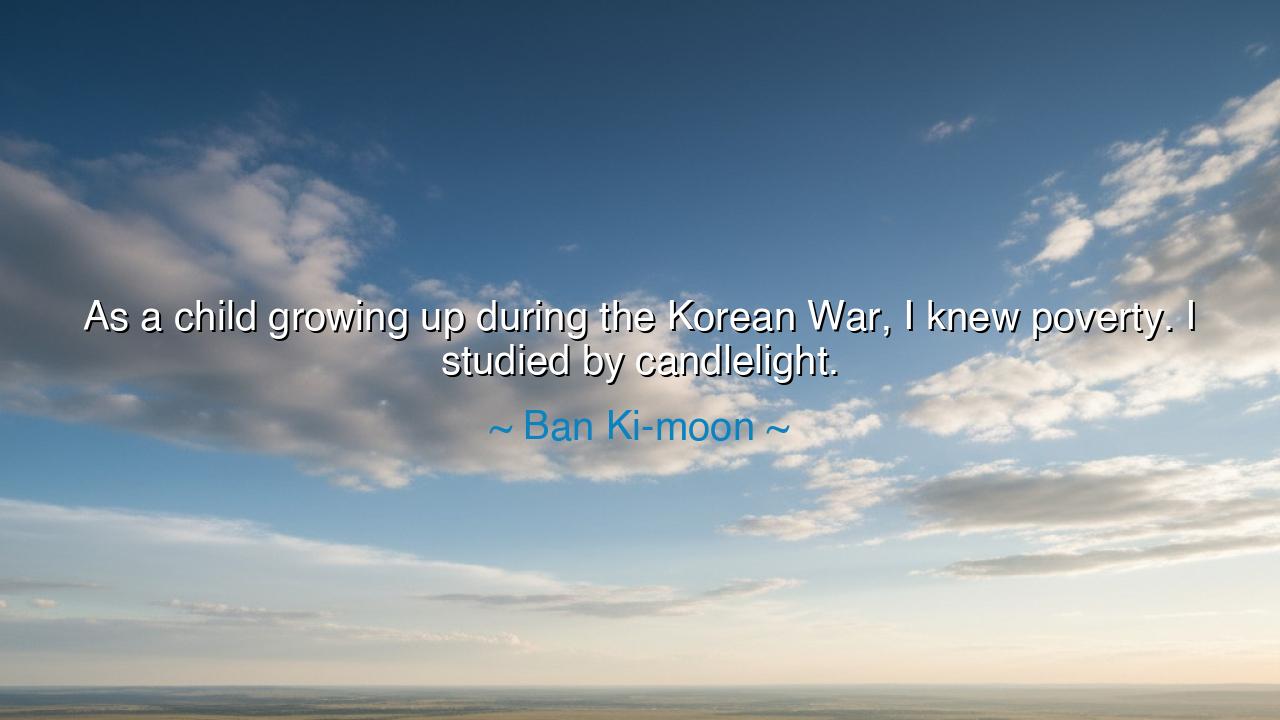
As a child growing up during the Korean War, I knew poverty. I






Hear the humble and enduring words of Ban Ki-moon, who said: “As a child growing up during the Korean War, I knew poverty. I studied by candlelight.” These words do not boast of triumph, but reveal the roots of resilience. They are the memory of a child born into chaos, who endured hardship not with despair but with determination, and whose spirit rose from the shadows of war to the light of service to the world.
The origin of this saying lies in the ashes of the Korean War, when a divided peninsula became the battlefield of powers greater than itself. Villages were burned, families were torn apart, and hunger stalked the land. In those years, young Ban Ki-moon did not grow up in comfort or safety. Instead, he grew up in the grip of poverty, where the luxuries of light and warmth were scarce, and even the flame of a candle became a tool of survival. His testimony is not merely personal—it is the witness of an entire generation who endured scarcity but clung to hope.
The meaning of his words is that even in the darkest of times, the light of knowledge can still be pursued. To study by candlelight is to declare that hardship shall not extinguish aspiration. Poverty may confine the body, but it need not imprison the mind. For those who kindle learning even amid suffering, the candle becomes more than flame—it becomes the torch of destiny. Ban Ki-moon reminds us that greatness often grows not from abundance, but from endurance in the face of want.
Consider the story of Abraham Lincoln, who, as a boy in the wilderness of America, also studied by firelight, scratching letters into wooden planks because paper was too rare. He, too, knew poverty, and yet he rose to guide a divided nation. Across time and nations, we see this truth: hardship, when met with perseverance, forges leaders whose wisdom is born not from ease but from struggle. Just as Lincoln’s log cabin gave way to the White House, Ban’s candlelit studies gave way to the halls of the United Nations.
The lesson is clear: poverty is not destiny. The conditions of birth need not determine the reach of one’s life. What matters is the fire within—the refusal to surrender hope, the courage to learn, the will to rise. Those who endure hardship and yet persist become beacons for others, showing that darkness need not be the end, but may instead be the place where strength is born.
What, then, must we do? We must not despise humble beginnings, nor overlook those who struggle in poverty today. Instead, we must provide them with tools—education, compassion, and opportunity—so that their candles may burn brighter. We must remember that every child studying in hunger, every family living in want, carries within them the potential to shape the future. Our task is to nurture that potential, not smother it with neglect.
Therefore, let Ban Ki-moon’s words echo as both testimony and challenge. If a boy who studied by candlelight amid war could rise to speak for nations, then none should doubt the power of endurance and learning. Let us kindle light wherever there is darkness, and hope wherever there is despair. For in lifting the poor, we not only honor their struggle, but we strengthen the whole of humanity. And thus, from the smallest flame, we may ignite the fire that guides the world toward peace and justice.






NYnhu y
I feel both admiration and sadness reading this. It’s inspiring that Ban Ki-moon overcame poverty, but also heartbreaking that a child had to endure such hardship just to learn. It makes me question: have we really advanced as a world if children today, in different wars, are still studying by candlelight or not studying at all?
KLKhanh Ly
This quote makes me think about how privilege often shapes opportunity. Ban Ki-moon had every reason to give up, yet he didn’t. It raises a larger question—do hardship and scarcity actually push some people to achieve greatness? Or is it simply that those who survive such times already possess an extraordinary inner drive that can’t be taught?
HAbui hoang anh
I’m struck by the contrast between the darkness of war and the light of the candle he studied by. It’s symbolic—a child refusing to surrender his hope for learning, even in chaos. That image feels timeless and powerful. How many potential leaders today are sitting somewhere in similar darkness, dreaming by candlelight of a better future?
TPHoang Trong Phu
Hearing Ban Ki-moon recall his early poverty makes me reflect on how personal experience influences leadership. Perhaps his background helped him understand global suffering in a way statistics never could. I wonder whether empathy born from hardship can make a person more effective—or does the trauma of such experiences sometimes weigh them down?
TADang Tuan Anh
There’s something deeply human about this image—studying by candlelight during war. It’s not just about struggle, but about resilience and determination. I can’t help but think of how many children today face similar conditions and yet dream of changing the world. What does it take for someone to turn hardship into motivation rather than despair?